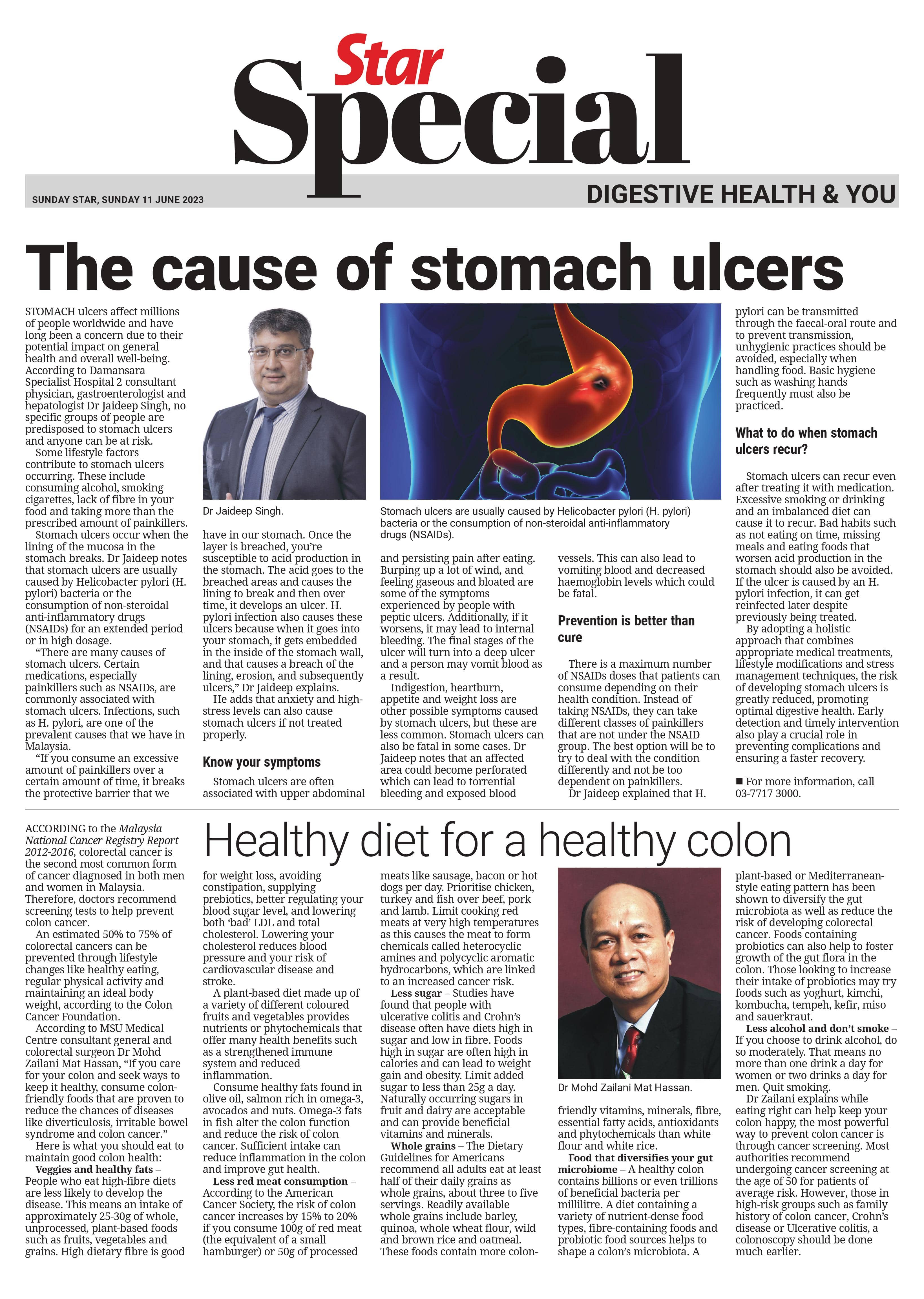The Cause of Stomach Ulcers

The Cause of Stomach Ulcers
STOMACH ulcers affect millions of people worldwide and have long been a concern due to their potential impact on general health and overall well-being. According to Damansara Specialist Hospital 2 consultant physician, gastroenterologist and hepatologist Dr Jaideep Singh, no specific groups of people are predisposed to stomach ulcers and anyone can be at risk.
Some lifestyle factors contribute to stomach ulcers occurring. These include consuming alcohol, smoking cigarettes, lack of fibre in your food and taking more than the prescribed amount of painkillers. Stomach ulcers occur when the lining of the mucosa in the stomach breaks. Dr Jaideep notes that stomach ulcers are usually caused by Helicobacter pylori (H. pylori) bacteria or the consumption of non-steroidal anti-inflammatory drugs (NSAIDs) for an extended period or in high dosage. “There are many causes of stomach ulcers. Certain medications, especially painkillers such as NSAIDs, are commonly associated with stomach ulcers. Infections, such as H. pylori, are one of the prevalent causes that we have in Malaysia. “If you consume an excessive amount of painkillers over a certain amount of time, it breaks the protective barrier that we have in our stomach. Once the layer is breached, you’re susceptible to acid production in the stomach.
The acid goes to the breached areas and causes the lining to break and then over time, it develops an ulcer. H. pylori infection also causes these ulcers because when it goes into your stomach, it gets embedded in the inside of the stomach wall, and that causes a breach of the lining, erosion, and subsequently ulcers,” Dr Jaideep explains. He adds that anxiety and high-stress levels can also cause stomach ulcers if not treated properly.
Know your symptoms
Stomach ulcers are often associated with upper abdominal and persisting pain after eating. Burping up a lot of wind, and feeling gaseous and bloated are some of the symptoms experienced by people with peptic ulcers. Additionally, if it worsens, it may lead to internal bleeding. The final stages of the ulcer will turn into a deep ulcer and a person may vomit blood as a result. Indigestion, heartburn, appetite and weight loss are other possible symptoms caused by stomach ulcers, but these are less common. Stomach ulcers can also be fatal in some cases. Dr Jaideep notes that an affected area could become perforated which can lead to torrential bleeding and exposed blood vessels. This can also lead to vomiting blood and decreased haemoglobin levels which could be fatal.
Prevention is better than cure
There is a maximum number of NSAIDs doses that patients can consume depending on their health condition. Instead of taking NSAIDs, they can take different classes of painkillers that are not under the NSAID group. The best option will be to try to deal with the condition differently and not be too dependent on painkillers. Dr Jaideep explained that H. pylori can be transmitted through the faecal-oral route and to prevent transmission, unhygienic practices should be avoided, especially when handling food. Basic hygiene such as washing hands frequently must also be practiced.
What to do when stomach ulcers recur?
Stomach ulcers can recur even after treating it with medication. Excessive smoking or drinking and an imbalanced diet can cause it to recur. Bad habits such as not eating on time, missing meals and eating foods that worsen acid production in the stomach should also be avoided. If the ulcer is caused by an H. pylori infection, it can get reinfected later despite previously being treated. By adopting a holistic approach that combines appropriate medical treatments, lifestyle modifications and stress management techniques, the risk of developing stomach ulcers is greatly reduced, promoting optimal digestive health. Early detection and timely intervention also play a crucial role in preventing complications and ensuring a faster recovery.
Source: The Star Special
For more information, contact 03-7717 3000.




 Promotion
Promotion
 Find Doctor
Find Doctor


